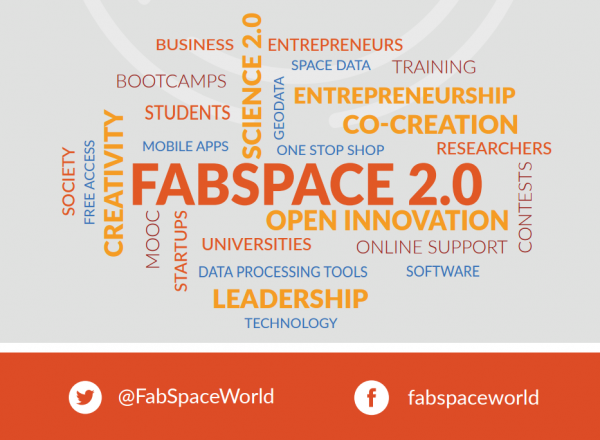FabSpace 2.0 in Universities 2.0
FabSpace 2.0 is the open-innovation network for geodata-driven innovation by leveraging Space data in Universities 2.0. Its Work programme topic addressed INSO-4-2015: Innovative schemes for open innovation and science 2.0 (b) Academia- Business/Public/CSO knowledge co-creation Coordination and support action.
The FabSpace 2.0 project aims at making universities open innovation centres for their region and improving their contribution to the socio-economic and environmental performance of societies. To achieve these general objectives, the FabSpace 2.0 project offers to concentrate on one research area with high expected socio-economic impact: data-driven innovation, with particular attention to Earth observation data.
In the six European regions covered by the consortium, partner universities work together with co-located Business Incubation Centres of the European Space Agency (ESA BICs). ESA BICs aim at inspiring entrepreneurs to turn space-connected business ideas into commercial companies and provide technical expertise and business-development support.
This project began on March 1st 2016 and will last 3 years. It is under the lead of Univ. Toulouse III – Paul Sabatier (UPS).

The objectives of the FabSpace 2.0 project are to:
- Set up and operate at University a free-access place & service where students, researchers and external users can make use of a data platform and design and test their own applications.
- Train the users to improve their capacity to process data and develop new applications.
- Network students, researchers, entrepreneurs, project managers in industry and public authorities, civil society organisations and other representatives of civilians, consolidate user needs and industry requirements, foster the co-creation of new innovative solutions, support further business development.
- Exploit, sustain and disseminate the concept.
The Work Plan will be implemented within 6 Work Packages:
- WP1 – Setting up and operating regional FabSpace services
- WP2 – Enhancing human capital among the targeted groups of users
- WP3 – Animation and Networking for innovation and entrepreneurial discovery
- WP4 – Exploitation and dissemination
- WP5 – Communication
- WP6 – Management
The major impacts of the project can be summarised as follows:
- Make universities & research organisations more involved in innovation activities, through the development of interactions with innovators in industry and the public sector, with an increasing socio-economic impact
- Boost innovation skills in public administration
- Equip researchers with innovation leadership knowledge
- Raise awareness of the potential of co-creation of new solutions and other open innovation activities.

